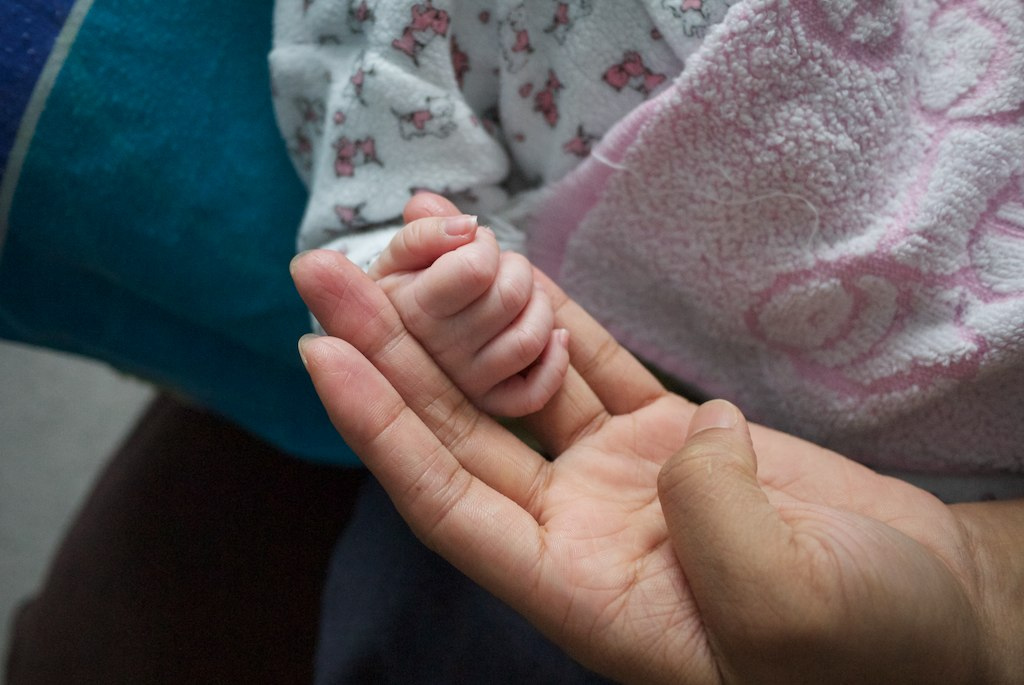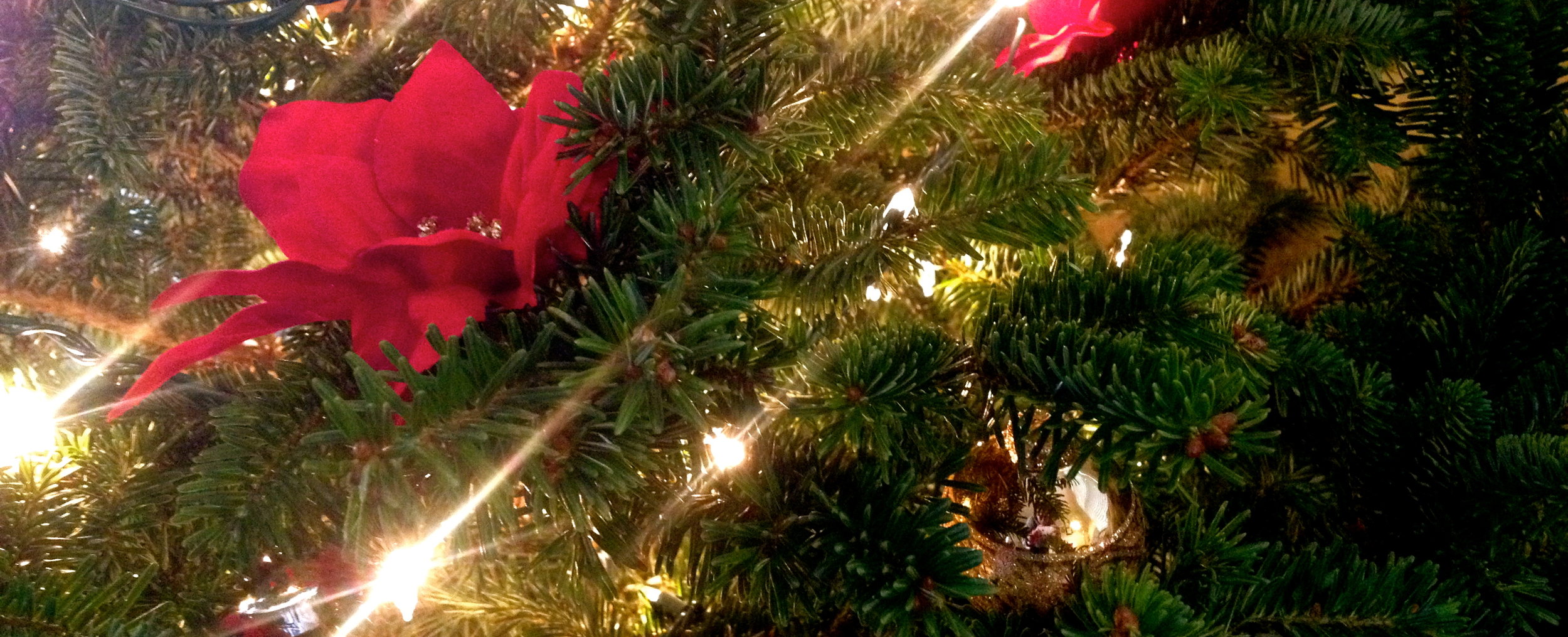This essay was originally published at Art House America.
No one ever tells you what it’s going to feel like to walk into a fertility center.
They don’t tell you because you don’t ask, and you don’t ask, because your mom had you and her mom had her. The normal way. Why would there be any problem? But if you’re like me, you wish you’d asked. And you wish someone had told you. So I will.
The room is going to be painted some awful color, like green or beige. The television is going to be on, but the volume won’t be loud enough for you to hear anything the CNN anchor is saying. And there will be other couples there, sitting side by side. Some will hold hands, in solidarity. Others will ignore each other and stare at their phones, scrolling, scrolling, scrolling. At first, you’ll be thankful for them. They’re like you. But be prepared, because after a few minutes, you’re going to hate them. All of them. Because they are your greatest hope and greatest fear and you don’t want to be like them, but there you are, sitting in the seat, waiting.
“Mr. and Mrs. Gibson?”
The nurse will call you by your last name. She’ll smile and lead you to a scale and ask if you’d like to take your boots off. “No need to weigh those,” she’ll joke. After she writes down a number, your husband will step on the scale, assuming it’s his turn. But then, she’ll shoo him away, because no one is really interested in him anyway.
Then she’ll close you two in another, smaller waiting room. There will be a desk. Somewhere in the room, there will be a plastic replica of a perfect female uterus. A lot of time will go by, and you’ll read an outdated House Beautiful and inspect the plastic fallopian tubes, wondering what in the hell is wrong with you that everyone else gets to be at work when you have to be sitting in this damn office waiting. Still waiting. And you’ll see a red button near the door that says “Call for Nurse.” You’ll get up to press it, but your husband will try to stop you.
“We’ve been waiting for more than an hour,” you’ll say. He will give in, let you press the button, but it will do nothing but light up like Rudolf’s nose. Don’t be surprised if you press it a few extra times, just for good measure. Still, nothing will happen.
“Sorry,” a nurse will say, finally, when she pops her head into the doorway. This nurse will be skinny, with glasses. “Ice on the roads.”
You’ll groan. You’ll wish you’d canceled the appointment, and though he won’t say it out loud, your husband will wish you had too.
And just when you’re ready to stand up and storm out of the clinic, the doctor will walk in, all smiles and apologies, holding a folder full of results and promises. She’ll be tall, with dark hair. Old enough to be trusted. She’ll pull out your medical files and go through them page by page. At first, you’ll think she’s thorough, but then you’ll realize this is the first she’s ever heard of you. And then she’ll stack the papers together and invite you to take off your clothes from the waist down.
When she comes back in the room, you’ll have a paper-thin sheet over your legs. The doctor will take a wand and cover it with lubricant and put it inside you and turn off the lights. The screen will turn on, showing nothing. Black and white, and empty. And your husband will hold your hand, and though you’re not alone, you will feel it.
You will feel it.
Infertility is a story of unrequited love.
When people ask how it feels, I say it’s kind of like having a fountain of water inside of you, with nowhere for the water to go. I have so much love I want to give, but no one to shower it upon. The object of my affection is just out of reach. And the love I want to give has nowhere to go. That’s a scary thing. Because love, bottled up, ignored and unused, can morph into all kinds of wild emotions. Sadness, of course. But it can also transform into grief, anger, and jealousy.
Love can so easily become bitterness.
C. S. Lewis put it perfectly in The Four Loves:
"To love at all is to be vulnerable. Love anything, and your heart will certainly be wrung and possibly be broken. If you want to make sure of keeping it intact, you must give your heart to no one, not even to an animal. Wrap it carefully round with hobbies and little luxuries; avoid all entanglements; lock it up safe in the casket or coffin of your selfishness. But in that casket—safe, dark, motionless, airless—it will change. It will not be broken; it will become unbreakable, impenetrable, irredeemable."
To desire anything at all is to be vulnerable, too. Though not everyone has experienced infertility, every single person knows how it feels to want something and not have it. Pain exists in the time between feeling a need and having that need met. So rather than feel the pain, I normally find a way around the wait. In fact, I live in a society that profits off my inability to endure even minor suffering. You can see it everywhere: Google answers any nagging question with a few clicks. Netflix serves up 13 episodes at a time because I can’t wait seven days for the next episode anymore. Amazon keeps warehouses running 24 hours a day simply because I will pay a premium for next-day delivery. There is nothing wrong with convenience. But when I get to the really difficult times in my life — times like this — I find that I’m really out of practice.
Several people have asked me what I am learning through all of this. First of all — before I answer that question, know that I hate that question. Why do I have to be learning something when everyone else seems to be getting along just fine without the school of infertility? (Insert groan.) I’m learning exactly what I’ve been learning my whole life: that I’m not in control, I’m flawed, and despite all that, I’m deeply loved. Those three hard truths are difficult to swallow.
I am not in control. This statement is the opposite of what I normally hear from the culture around me. The world tells me that No One is out there with a plan for me, so I better make one up for myself. The world tells me to take back the reins. The world says I can find happiness in seven easy steps. Worst of all, the world says I can “plan parenthood,” which I can’t. (Believe me, if I could, I’d be a parent already.) I’m constantly brushing up with my desire to be in charge. If we try IVF or start down the road to adoption, those plans are just as uncertain, but for a time, they at least feel like plans. I swing on a pendulum between earnest effort and complete powerlessness.
I am flawed. On an anatomical level, my body is not doing (or won’t yet do) what I know it is supposed to do. This is a rough pill for me to swallow not only because we can’t get pregnant, but also because for years, I’ve liked to think I’m a pretty healthy person. I could nod my head theoretically, and agree that I am flawed — as in, I have character flaws. Sure! We all do! I’m a lying, cheating, prideful thief just like the rest of you! But to see evidence of brokenness in the world in my own body is a new sensation, and it’s painful. It shatters everything I thought I knew about sin. Sin isn’t just in my heart. It affects my body, too.
Next to these two is a third truth: I am deeply loved. This is the hardest truth of all.
The way it goes in my mind is so different. I am not in control. I am flawed. So I am doomed. That’s how it feels. That’s the logical progression of thought. That’s what I feel on the inside. But if what the Bible says is true, then my powerlessness isn’t the end, but the beginning of God’s mercy. In my weakness, He is strong. In my brokenness, He is drawing ever closer. Yes, the world is chaotic and wildly tragic — but I am at the center of God’s affection through it all, like He’s placed me perfectly within the eye of the storm. I may be thrown about and bruised, but I am not destroyed. He has His eye upon the sparrow. And He has His eye upon me, too.
Infertility is a story of unrequited love. But God wrote that story. A parent who deeply desires a relationship with His children? Yeah. He gets that. He loves us. He desires to place all of His love squarely upon our heads. He is waiting for us to awaken to the truth, for us to take our first spiritual breath.
The yearning I feel for a child is deep, painful, and raw. And if that is so, how much more must God yearn for His children? I can’t fathom it. The earth couldn’t contain His shouts of sorrow for the ones lost. The earth couldn’t contain His joy for the ones brought near.
So I will draw near to Him. I am a mother, without a child. He knows.


 Why hide their nakedness first? Why was that their first reaction? I tried to think as if I were Eve. Why would I reach for a leaf, even as I wiped juice from the corner of my mouth with the back of my bare arm?
Why hide their nakedness first? Why was that their first reaction? I tried to think as if I were Eve. Why would I reach for a leaf, even as I wiped juice from the corner of my mouth with the back of my bare arm?
 It was the Christmas my dad turned into a full bird. My mother and I were in a department store at the Garden State Plaza surrounded by bows, glitter, and faux firs decorated from tip to trunk with lights and glass-blown ornaments. I was eleven, a sixth grader with snaggly teeth, bangs and the patience of a newborn squirrel. But I knew my mission.
"Something gaudy," my mother instructed. "It's got to be huge."
It was the Christmas my dad turned into a full bird. My mother and I were in a department store at the Garden State Plaza surrounded by bows, glitter, and faux firs decorated from tip to trunk with lights and glass-blown ornaments. I was eleven, a sixth grader with snaggly teeth, bangs and the patience of a newborn squirrel. But I knew my mission.
"Something gaudy," my mother instructed. "It's got to be huge."